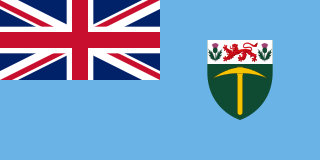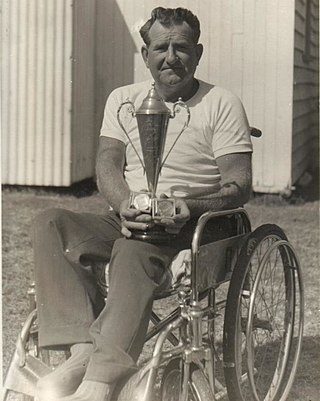
Australia has participated officially in every Paralympic Games since its inauguration in 1960 with the exception of the 1976 Winter Paralympics.

Rhodesia competed at the 1968 Summer Paralympics in Tel Aviv, Israel from 4 to 13 November 1968. The team ranked eleventh out of the twenty-eight competing nations in the medal table and won a total of twenty medals; six gold, seven silver and seven bronze. Rhodesia competed at the Paralympics in 1968 and in 1972 despite being excluded from the Summer Olympic Games in those years.

Australia sent a team to compete at the 1972 Summer Paralympics in Heidelberg, West Germany. Australian won 25 medals - 6 gold, 9 silver, and 10 bronze medals in six sports. Australia finished 11th on the gold medal table and 9th on the total medal table.

Great Britain sent a delegation to compete at the 1972 Summer Paralympics in Heidelberg, West Germany. Teams from the nation are referred to by International Paralympic Committee (IPC) as Great Britain despite athletes from the whole of the United Kingdom, including those from Northern Ireland, being eligible. They sent seventy two competitors, forty seven male and twenty five female. The team won fifty-two medals—sixteen gold, fifteen silver and twenty-one bronze—to finish third in the medal table behind West Germany and the United States. Philip Craven, the former President of the IPC, competed in athletics, swimming and wheelchair basketball for Great Britain at these Games.

Australia has participated in every Summer Paralympic Games since the inception of the Paralympics in the year 1960. The 1976 Paralympic Games in Toronto was Australia's fifth Paralympic Games. Australia competed in 10 out of the 13 sports and were able to win medals in six of these sports. There were 44 athletes representing Australia at the Games with a number of these athletes participating in multiple sports. Of the 44 athletes, 34 were males and 10 were females. As a team, Australia won 41 medals, 16 of which were gold. This placed it just outside the top 10 in 11th position at the end of the Games. The Australian team won more gold medals at the 1976 Paralympic Games than at any of the previous four Paralympic Games. 26 athletes finished on the podium in their respective events. This represents more than half the number of athletes that Australia sent to Toronto. Six world records were broken by Australian athletes on their way to winning their respective events.

Daphne Jean Hilton was an Australian Paralympic competitor. She was the first Australian woman to compete at the Paralympic Games. She won fourteen medals in three Paralympics in archery, athletics, fencing, swimming, and table tennis from 1960 to 1968.

Roy Fowler was an Australian Paralympic competitor, who won ten medals at six Paralympics from 1964 to 1988.

Richard Nicholson is an Australian Paralympic powerlifter and athlete. He has competed at five successive Paralympic Games from the 1996 to 2012 Summer Paralympics. At the 2000 Games, he won a silver medal in the powerlifting Men's Up to 60 kg event. In athletics, at the 2004 Athens Paralympics he won a silver medal in the Men's 4 × 100 m T53–54 event and at the 2012 London Paralympics a bronze medal in the Men's 4 × 400 m T53–54 event.

Australia competed at the 1980 Summer Paralympics in Arnhem, Netherlands. It was the 6th Summer Paralympic Games in which Australia had competed. These Games were the biggest Paralympics yet, with 1,973 people participating. Of those participants, 57 were Australian. The team was made up of 45 men and 12 women, and was Australia's largest team to compete at any Paralympic Games so far.

Australia competed at the 1988 Summer Paralympics in Seoul, South Korea in 16 sports, winning medals in 6 sports. Gold medals were won in three sports – athletics, lawn bowls and swimming. Australia won 95 medals – 23 gold, 34 silver and 38 bronze medals. Australia finished 10th on the gold medal table and 7th on the combined medal table. Australian Confederation of Sports for the Disabled reported another medal ranking after Games with Australia being 2nd ranked in amputee sports, 8th in wheelchair sports, 11th in blind sports and 12th in cerebral palsy sports.

Australia competed at the 1992 Paralympic Games in Barcelona for physically and vision-impaired athletes. Immediately after the Barcelona Games, the city of Madrid held events for athletes with an intellectual disability. The Madrid results are not included in International Paralympic Committee Historical Results Database. Australia finished 7th in the total medal count winning 76 medals. Australia competed in 13 sports and won medals in 3 sports – swimming, athletics and weightlifting. Australia finished first in the medal tally at the 1992 Paralympic Games for Persons with Mental Handicap in Madrid.

Gregory Stephen Smith, OAM is an Australian Paralympic athlete and wheelchair rugby player who won three gold medals in athletics at the 2000 Summer Paralympics, and a gold medal in wheelchair rugby at the 2012 Summer Paralympics, where he was the flag bearer at the opening ceremony. Since 2018, he has been the Assistant Coach of the Australian Steelers.

The 13th International Stoke Mandeville Games, later known as the 1964 Summer Paralympics, was an international multi-sport event held in Tokyo, Japan, from November 3 to 12, 1964, in which paraplegic and tetraplegic athletes competed against one another. The Stoke Mandeville Games were a forerunner to the Paralympics first organized by Sir Ludwig Guttmann in 1948. This medal table ranks the competing National Paralympic Committees (NPCs) by the number of gold medals won by their athletes.

The Commonwealth Paraplegic Games were an international, multi-sport event involving athletes with a disability from the Commonwealth countries. The event was sometimes referred to as the Paraplegic Empire Games and British Commonwealth Paraplegic Games. Athletes were generally those with spinal injuries or polio. The Games were an important milestone in the Paralympic sports movement as they began the decline of the Stoke Mandeville Games' dominating influence. The event was first held in 1962 and disestablished in 1974. The Games were held in the country hosting the Commonwealth Games for able-bodied athletes, a tradition eventually fully adopted by the larger Olympic and Paralympic movements.

Rheed McCracken is an Australian Paralympic athletics competitor. He named the 2012 Junior Athlete of the Year as part of the Australian Paralympian of the Year Awards. He represented Australia at the 2012 London Paralympics, 2016 Rio Paralympics, 2020 Tokyo Paralympics and the 2024 Paris Paralympics, where he won three silver and three bronze medals.
Australia was represented in archery at the first 1960 Summer Paralympic Games. Three athletes - Ross Sutton, Tony South and Alan Conn have won gold medals. Australia has won medals at six Games.

Anthony Eric "Tony" South OAM AM is an Australian Paralympic archer who won a gold medal and two silver medals at the 1968 Summer Paralympics and a bronze medal at the 1972 Summer Paralympics.

Jonathon Milne is an Australian Paralympic archer. In April 2015 he won the National Para Championships, held in Melbourne. He represented Australia at the 2016 Rio Paralympics where he won a bronze medal. Milne won a bronze medal at the 2023 World Para Archery Championships. He competed at 2024 Paris Paralympics - his third Paralympics.
Victor Salvemini was an Australian Paralympic athlete from Western Australia. As a wheelchair athlete, he competed in several sports including archery, basketball and track sprinting in the 1970s. A paraplegic, he lost the use of both his legs after a car accident in Fremantle, Western Australia in 1961 when he was 14 years old.











